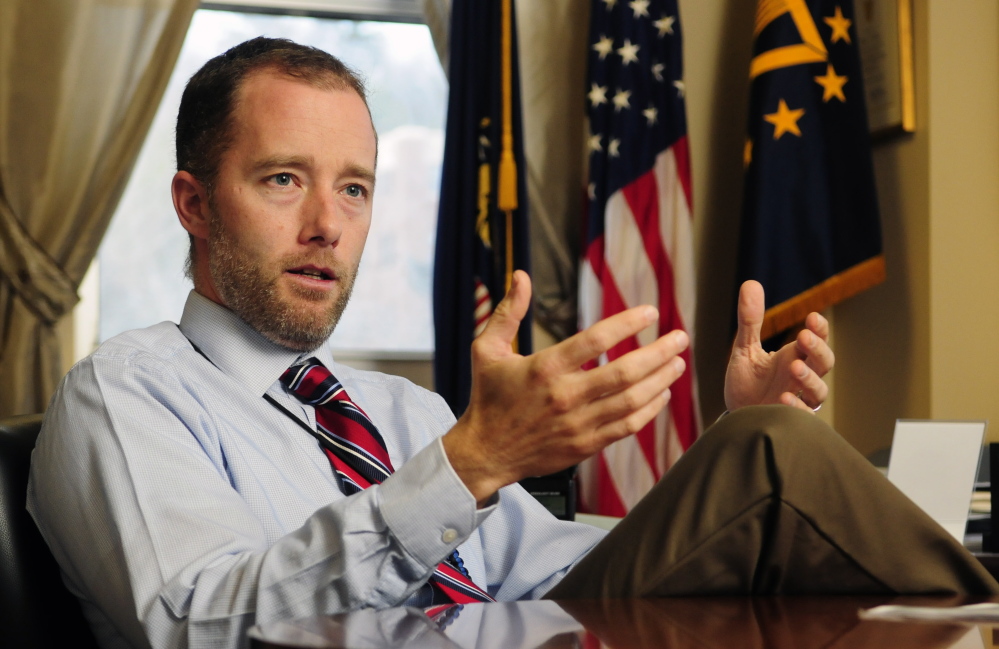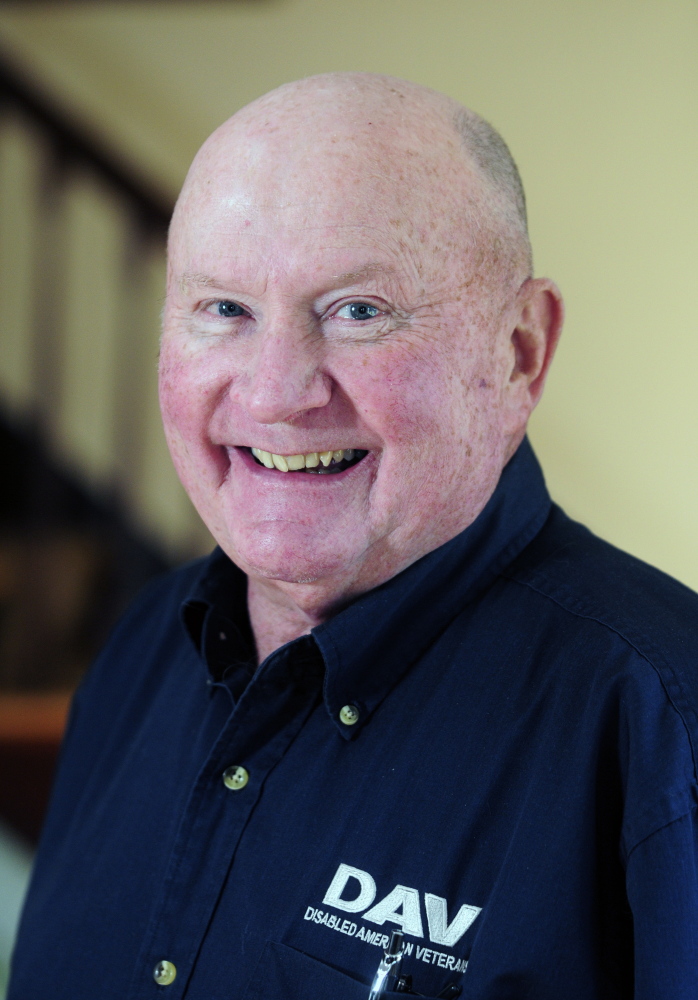TOGUS — Allegations that officials at the VA Maine Healthcare System took shortcuts and withheld information from patient files in an effort to meet national benchmarks have prompted a federal probe of services there.
While it’s not clear what impact that has on the nearly 10,000 veterans who receive treatment statewide for issues such as post-traumatic stress disorder and depression, a veterans benefits lawyer said if the claim that information was omitted from patient files is true, it would be “absolutely huge.”
But Togus Director Ryan Lilly said Thursday that while the allegations are serious and will be corrected if needed, he hasn’t seen evidence substantiating them or indicating staff malfeasance.
“One way or another, we’ll get to the bottom of all this,” Lilly said from his office at Togus, the federal campus outside Augusta that runs the statewide veterans network. “If there were mistakes made, those will be corrected and if not, we’ll still be working to improve the system.”
A memo sent in October by a federal watchdog agency to Togus employees — obtained by the Kennebec Journal under the federal Freedom of Information Act — outlines allegations of “inappropriate practices” in mental health services. The allegations link Togus for the first time to issues similar to those at veterans’ hospitals nationwide that sparked a scandal earlier this year.
Officials from the Office of the Inspector General in the U.S. Department of Veterans Affairs visited Togus in late October to interview employees and review documents in connection with the allegations, but haven’t filed a report yet and haven’t commented on the investigation’s specifics. Lilly said he doesn’t expect the report to come out for at least three months.
The inspector general’s office has been mum on the reasons for the probe, which was requested by the office of U.S. Rep. Mike Michaud, an outgoing Democrat from Maine’s 2nd Congressional District whose office hasn’t said who the allegations came from.
However, the claims match concerns held by current and former employees at Togus who have spoken with the Kennebec Journal over the past five months but weren’t willing to speak publicly. Lilly acknowledged problems with morale among staff in mental health, a unit that he said has had trouble attracting psychiatrists and psychologists and has been understaffed in recent years.
The October memo was written by Melanie Krause, associate director of clinical review management at the inspector general’s office. It says that Togus employees may have left out information from patient files about mental illnesses, which may have stemmed from combat service and required treatment. Togus allegedly did this to tamp down the number of veterans seeking care at provider centers across the state, the memo says.
Furthermore, it says that Togus officials could have presided over scheduling ploys that masked the true periods of time that mental health patients waited for appointments. Veterans advocates said they were worried by the claims.
“I go to my doctor and I’m trusting that they know what they’re doing,” said Gary Burns of Augusta, a retired service officer for Disabled American Veterans in Maine who was injured in the Vietnam War. “This is a violation, to some degree, of that trust, and that concerns me.”
GAMING THE SYSTEM?
Omissions in patient files may be the most serious allegation that drew the inspector general’s office in the U.S. Department of Veterans Affairs to the Togus campus for an inspection of mental health services last month.
In the short term, those alleged omissions would mean that veterans may have gone without care. Long term, incomplete records could leave veterans unable to prove they’re eligible for benefits providing needed counseling. Lilly, though, said he told the inspector general’s office he had not seen evidence of “an instruction to omit things” as a strategy at Togus, and he has no proof that claims were affected.
Still, Joseph Moore, a lawyer at Bergmann & Moore, a Maryland firm handling veterans’ benefits appeals claims, said if substantiated, that claim “is absolutely huge” and would mean that “administrators got treatment providers to lie, to the obvious and direct detriment of the veterans they were treating.”
Even so, Moore and others cautioned that issues alleged at Togus are similar to VA problems nationwide, including a shortage of health professionals that the federal department’s new secretary, Robert McDonald, wants to fix.
“If it’s happening here, it’s happening all over the country,” said John Wallace, of Limestone, an Army veteran and the president of Vietnam Veterans of America in Maine.
Gaming of wait lists has been alleged at VA hospitals nationwide since earlier this year, when whistleblowers at a Phoenix VA hospital said separate lists were kept: One was public and electronic, while the other was offline, secret and kept to falsify patients’ real wait times. Similar manipulation was also reported at VA hospitals in Chicago, Colorado and Texas.
Togus avoided scrutiny around wait times when the national scandal broke, as its 2013 records showed that more than 98 percent of established primary-care patients — those who have attended the hospital before — got appointments within 14 days of requesting them.
VA policy says first-time patients requesting services should receive a preliminary evaluation within a day and a more comprehensive exam within 14 days. The October memo, though, details allegations that Togus mental health officials also worked to manipulate wait time records.
Administrators whose hospitals meet certain benchmarks such as the 14-day wait time get bonuses, and protecting those incentives has been cited as a reason for wait-time manipulation nationwide. A VA audit conducted in May said these practices were “sufficiently pervasive” to require a federal review of “whether current measures and targets for access are realistic or sufficient.”
To meet the same-day requirement for preliminary evaluations, Krause wrote that for several weeks, Togus allegedly stopped scheduling advance mental health appointments in lieu of drop-in appointments, which wouldn’t be tracked. For some time, Togus officials allegedly refused services to patients who weren’t willing to be seen within 14 days and certain referrals weren’t tracked, Krause wrote.
But Lilly said he hasn’t seen evidence of that, noting that those waiting times are just one factor of many that administrators are evaluated on. In September, wait times in Maine for mental health services were nearly 17 days, just above the national average, according to VA data. Lilly said using drop-in appointments wouldn’t necessarily ease the hospital’s workload, because future appointments are often scheduled at those clinics.
Burns and other advocates said veterans aren’t bringing new concerns to them regarding long waits in mental health at Togus, but some of the issues could be difficult for individual veterans to notice. Kennebec County Sheriff Randall Liberty, an Army veteran who is treated for post-traumatic stress disorder at Togus, said he is always seen promptly.
Of the allegations, he said, “That just hasn’t been my experience.”
STAFFING CONCERNS
Staff shortages at Togus could explain other allegations in Krause’s memo. Nationally, low staffing levels at VA hospitals have been a concern.
President Barack Obama signed a bill in August that provided funding to hire thousands of doctors, nurses and other health professionals. Between 2009 and 2013, the number of veterans getting VA healthcare rose by 14 percent nationwide, with many Iraq and Afghanistan veterans among them.
Demand for mental health services has gone up as well. In Maine, mental health consults — or appointment requests — went up by more than 30 percent between 2011 and 2014, according to Togus data, while staff numbers fluctuated from 80 in 2012, to 72 in 2013, and to 79 now. The Maine VA health care system has about 1,400 employees.
There are still 10 mental health vacancies at Togus, Lilly said, and he noted that high-level employees, including psychiatrists, must be on-call at times at Togus — unlike requirements at other health providers. That responsibility, among other factors, makes it difficult to fill vacancies, he said. Lilly said he has heard from staff members who wonder if their workloads are being made intentionally larger because Togus won’t hire people.
That’s not true, he said, because they’ve been trying to fill vacancies.
“I’m concerned about the morale,” Lilly said. “I’m concerned about our ability to recruit. We’ve had struggles.”
But Lilly said he hasn’t seen those factors as an indication that veterans get worse service because of it. Krause’s memo, though, said patients were allegedly put into group sessions and other programs to meet benchmarks for timely care, “despite staff concerns about the clinical appropriateness of these practices.” Krause also wrote that the hospital may have relied on nurse practitioners to see patients for medication management “even though this was outside of their scope of practice.”
Again, Lilly said he hasn’t seen evidence of those allegations. But Maine veterans advocates have long complained of low staffing levels, particularly in mental health.
“They need more mental health beds,” said Gary Laweryson, of Waldoboro, chairman of the Maine Veterans Coordinating Committee, a group of veterans service organizations, “and they need more mental health people that are good at what they do.”
Michael Shepherd — 370-7652
Twitter: @mikeshepherdme
Send questions/comments to the editors.






Comments are no longer available on this story